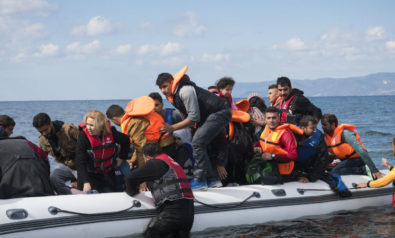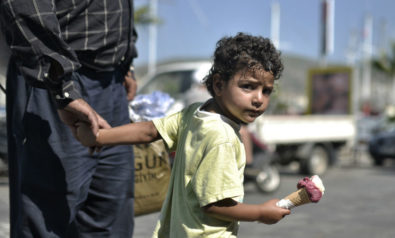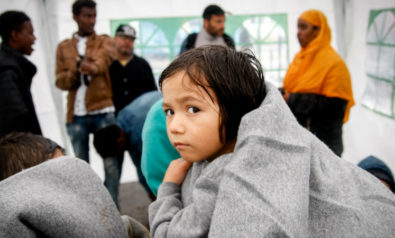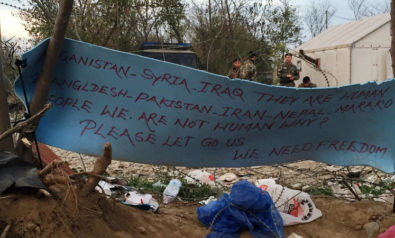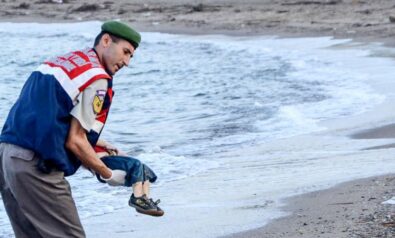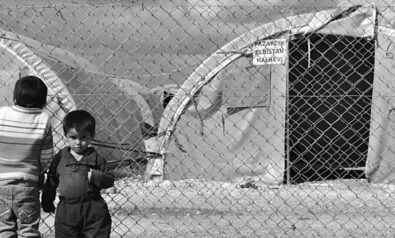Alan Kurdi’s death speaks to the continued horrors stemming from a ravaged Syria.
Though the images of death have become numbingly common, the picture of a young Syrian boy washed up on the shore of a Turkish beach is devastating. The juxtaposition of a dead child on one of the world’s most stunning beaches should not be lost on its viewers.
The death of 3-year-old Alan Kurdi is a vivid encapsulation of how dire the Syrian crisis—and its subsequent refugee groundswell—has become. Alan died along with 12 others, including his mother and 5-year-old brother, when their boat capsized en route to Greece. The family had been reportedly trying to immigrate to Canada.
The image of Alan’s death is undoubtedly putting European migration policies under the microscope, as it is now apparent that the status quo of limiting the ability of Syrians to enter Europe legally is not working.
Member states of the European Union (EU) have pledged to resettle some Syrians who are seeking asylum—the majority of that number has been pledged by Germany. Data shows that in 2015, Britain received 25,571 applications for asylum, compared to Germany which received 296,710 over the same time period.
Despite the pledges, the forced emigration of people from their homes in Syria is causing turmoil for both Syrians and potential host countries, which are often unwilling or unable to host them. While EU members met on September 3 to discuss the emergency, the issue of the European migration problem is embroiled in bureaucracy.
Speaking to reporters in Belgium, Hungarian Prime Minister Viktor Orban said: “The problem is not a European problem; it’s a German problem.” He added: “All of them would like to go to Germany; our job is only to register them.”
Germany is said to expect 800,000 asylum seekers to come this year but, according to Orban, German Chancellor Angela Merkel said they must first be registered before leaving Hungary. While Hungary admits its role as a weigh station of sorts for Syrian migrants, it has been criticized for installing a barbed-wire fence along its 100-mile border with Serbia in an effort to prevent refugees from crossing into the country illegally.
Latest statistics from the UN Refugee Agency (UNHCR) show there are over 4 million Syrian refugees who are registered. This, of course, does not account for Syrians who are either unregistered refugees or are internally displaced.
The large majority of Syria’s refugees have been hosted by five countries: Egypt, Iraq, Jordan, Lebanon and Turkey. Despite opening their doors to refugees, many of these countries—which are buckling under their own economic, social and political fissions—are bursting at the seams in trying to accommodate the overwhelming number of Syrians who are trying to take refuge.
Increasingly, pressure to accept Syrian refugees has been placed on Arab Gulf countries. In the midst of this refugee crisis, an official from the United Arab Emirates (UAE) said on September 3 that the best way the UAE can help refugees is to continue to dole out humanitarian aid, instead of allowing them to settle in the country. “We believe that it is in the best long term interests of the refugees to be close to their homes, so that it will be easier for them to return when this conflict has come to an end,” the official said. According to the official, the UAE has given more than $537 million in humanitarian aid during this crisis.
America’s Response
The United States subscribes to a similar approach. Of the 4 million registered Syrian refugees, America has only accepted 1,000 of them. However, US Secretary of State for Population, Refugees and Migration Anne Richard recently said the US is working to increase the numbers it will admit. State Department Spokesman Mark Toner said on September 3 that the US is likely to admit around 1,800 Syrian refugees to America by the end of this fiscal year.
When asked about the number of Syrian refugees the US has taken in, White House Spokesman Josh Earnest focused on US financial support, saying: “It warrants mentioning that the United States has provided more than $4 billion dollars in humanitarian assistance to those affected by the conflict in Syria since 2011. That’s a substantial commitment and certainly more than any other country has done.”
Earnest added: “[The] United States provides significant assistance through the UN High Commissioner for Refugees. We support that process, and there is an international effort to try to meet some of these urgent humanitarian needs.”
On September 3, State Department Spokeswoman Dina Badawy told Fair Observer of a State Department review of its policy toward the admission of Syrian refugees. “Mindful of the particular conditions of the Syria crisis, the US has reviewed the security screening protocols for refugees, which are extremely rigorous; worked to further enhance the forms of security screening applicable to this particular population; and continue to examine options for additional enhancements.”
She added: “The United States remains deeply committed to achieving the dual goals of safeguarding the American public and providing refuge to some of the world’s most vulnerable people.”
The United States has long seen the crisis in Syria as a political quagmire, where it is caught between two unfavorable choices, in which it has thus far chosen neither: To ignore the growing security threats stemming from the Syrian crisis, or to devote on-the-ground military might to another conflict in the Middle East.
Seemingly, not much has improved since the Syrian conflict began in March 2011. When thinking about Alan Kurdi, it is sobering to think that he was born into the Syrian crisis and died at its hands. While his death, and the similar death of so many others, speaks to the continued horrors stemming from a ravaged Syria, it also speaks to how much more needs to be done by the international community for Syrian refugees.
*[Note: This article was updated on January 5, 2016.]
The views expressed in this article are the author’s own and do not necessarily reflect Fair Observer’s editorial policy.
Photo Credit: Thomas Koch / Shutterstock.com
 We bring you perspectives from around the world. Help us to inform and educate. Your donation is tax-deductible. Join over 400 people to become a donor or you could choose to be a sponsor.
We bring you perspectives from around the world. Help us to inform and educate. Your donation is tax-deductible. Join over 400 people to become a donor or you could choose to be a sponsor.
Support Fair Observer
We rely on your support for our independence, diversity and quality.
For more than 10 years, Fair Observer has been free, fair and independent. No billionaire owns us, no advertisers control us. We are a reader-supported nonprofit. Unlike many other publications, we keep our content free for readers regardless of where they live or whether they can afford to pay. We have no paywalls and no ads.
In the post-truth era of fake news, echo chambers and filter bubbles, we publish a plurality of perspectives from around the world. Anyone can publish with us, but everyone goes through a rigorous editorial process. So, you get fact-checked, well-reasoned content instead of noise.
We publish 2,500+ voices from 90+ countries. We also conduct education and training programs
on subjects ranging from digital media and journalism to writing and critical thinking. This
doesn’t come cheap. Servers, editors, trainers and web developers cost
money.
Please consider supporting us on a regular basis as a recurring donor or a
sustaining member.
Will you support FO’s journalism?
We rely on your support for our independence, diversity and quality.




